On a crisp autumn Sunday circa 1985, as soon as I came back home from playing basketball with my friends all afternoon in our neighborhood and inhaled the aroma of my mother's beef stew and cornbread that I would soon devour, after washing up, I noticed that my father, Charles, had left that week's edition of Parade Magazine on my bed with a note that read: "read this—and let's discuss."
As I sat eating dinner and reading the piece, I was reintroduced to the concept of apartheid in South Africa, a topic first introduced to me earlier that year when my father and I discussed Randall Robinson, a Black lawyer and leader of TransAfrica who was garnering significant press for his efforts to dismantle South Africa's version of the Jim Crow system.
Being 13 years old, as I read the words and viewed the pictures, I could clearly see that the protesters in one photo were all Black—but if I am to be completely honest, while I understood that the apartheid system seemed flawed, I didn't feel any personal connection at all with the plight of those conducting the protests.
As I discussed my feelings of relative indifference with Dad, he countered by noting that the apartheid system was akin to Jim Crow, and that South Africa's leaders, like Prime Minister P.W. Botha, were ideologically similar to the old Jim Crow era governors like Ross Barnett (Mississippi), Orval Faubus (Arkansas), and George Wallace (Alabama)—the men who had been the bane of his and other American Blacks existences only one generation earlier.
As I knew fully well who those motley minions of racist menace were, my dad's direct connection to Black America’s immediate past did raise my empathy meter for Black South Africans before our conversation ended that evening and it was time for me to get ready for school the next day.
When I think back on my childhood in the 1980's in general, and specifically to my growing interests in history and politics, I remember easily that the "MTV Decade" was notable for serious protests in two areas—ending apartheid, and ending the Cold War and the specter of global nuclear war between the United States and the Soviet Union.
Randall Robinson protesting apartheid at the South African embassy circa 1984
In fact, one could hardly turn on the major network news shows back then without seeing some protest march, hunger strike, or sit-in that was occuring on college campuses and embassies to shed light on those critically important issues!
A couple of years later, as my friends and I sat down one Friday evening during the Bethel Baptist Church lock in to watch Spike Lee's School Daze at the old Parkway Five theater, it did not go unnoticed by me that the very first scene of that iconic film included the protagonist, "Dap" (played by Laurence Fishburne) squaring off against his antagonist, "Dean Big Brother Almighty" (played by Giancarlo Esposito), as the latter's "Gamma Dogs" disrupted the former's "End Apartheid" protest rally on campus.
Check out the “Free Mandela” poster in the back as Dap and Big Brother Almighty almost come to blows early in the classic film School Daze circa ‘88…
By the time I entered college in 1990, the Cold War was over, South African freedom fighter Nelson Mandela had been freed from prison, and apartheid had finally been dismantled! Thus, the college student protesters of the 1980's had done what the student protesters of the 1960's had done before them, which was to raise awareness about systemic injustice in a way that compelled policy makers and politicians to make the formal changes necessary to help perfect a wholly imperfect Union here at home—while securing a fragile peace abroad.
Nota Bene: The majority of the protesters that took the most savage beatings during the Civil Rights era were peaceful high school and college students following the orders of Dr. Martin Luther King et al…
And yet, even during my own school days, there were still protests to be waged, whether it was police brutality against Black people (Rodney King), inequities in criminal punishment according to race, or attacks against equal funding and affirmative action in public education; if one had a desire to raise their voices for the common good, there was no shortage of causes to champion in the 90's and even beyond!
Which brings me to my main point this Sunday, which is that student protesters today are doing what student protesters have done for generations, which is, in the words of the late Frederick Douglass, to “agitate, agitate, agitate!”
In an era in which so many of our youth spend far more time playing video games or creating dance reels for Tik-Tok or other social media uploads, I find it encouraging to see so many more young people taking the time to learn the roots of the decades long struggle between Israel and Palestine—and to advocate their positions with passion and clarity.
Now, as it was back in the day, there always will be a few protesters on either side who are wayward in their tactics—and as was the case then and now, those who seemingly only want chaos and violence will find themselves locked up or, if not, at least on the wrong side of history once the final stories are written.
But my concern today remains that we don't stamp out the fire of the many millions of students who are NOT fomenting violence, but are simply using their voices and their bodies to advocate their positions peacefully on their college campuses!
Long after my own student days were done, I gladly assisted the efforts of Florida College students known as "The Dream Defenders" when they occupied Florida's Capitol Complex for nearly two months to protest the state's Stand Your Ground law after Trayvon Martin's murderer, George Zimmerman, was acquitted.
Morehouse Man Julian Bond—with fellow Morehouse Man Chuck Hobbs—supporting Florida's student “Dream Defenders” when they occupied the Capitol after George Zimmerman’s acquittal in July of 2013
As a then 41 year old man, I didn't condescend and tell those students to "go home" and "focus on school," because I knew that the students were getting multiple semesters' worth of knowledge sleeping, eating, and protesting on the cold marble floor in Florida's Capitol! Nope, I chose to use my writing platform to sing their praises in the mainstream media, while joining local philanthropists by providing food and water for their righteous (and First Amendment protected) cause!
The right to peacefully protest is as American as jazz, baseball, and Apple Pie. Pictures of Ol’ Hobbs through the years protesting against former Florida Gov. Rick Scott (2012), capital punishment (2013), and various bans, including books, across our state (2023)…
To me, such is true circular learning; I was educated by parents and teachers who grew up during the Civil Rights Movement; I had my own experiences observing the anti-apartheid efforts as a kid—while participating in anti-racism protests as a young adult—all the while spending what's now the early autumn of my years supporting the younger generations by dispensing knowledge, wisdom, professional services, and funding to ensure that the light of activism continues to burn hot for generations to come.
Lest we forget...





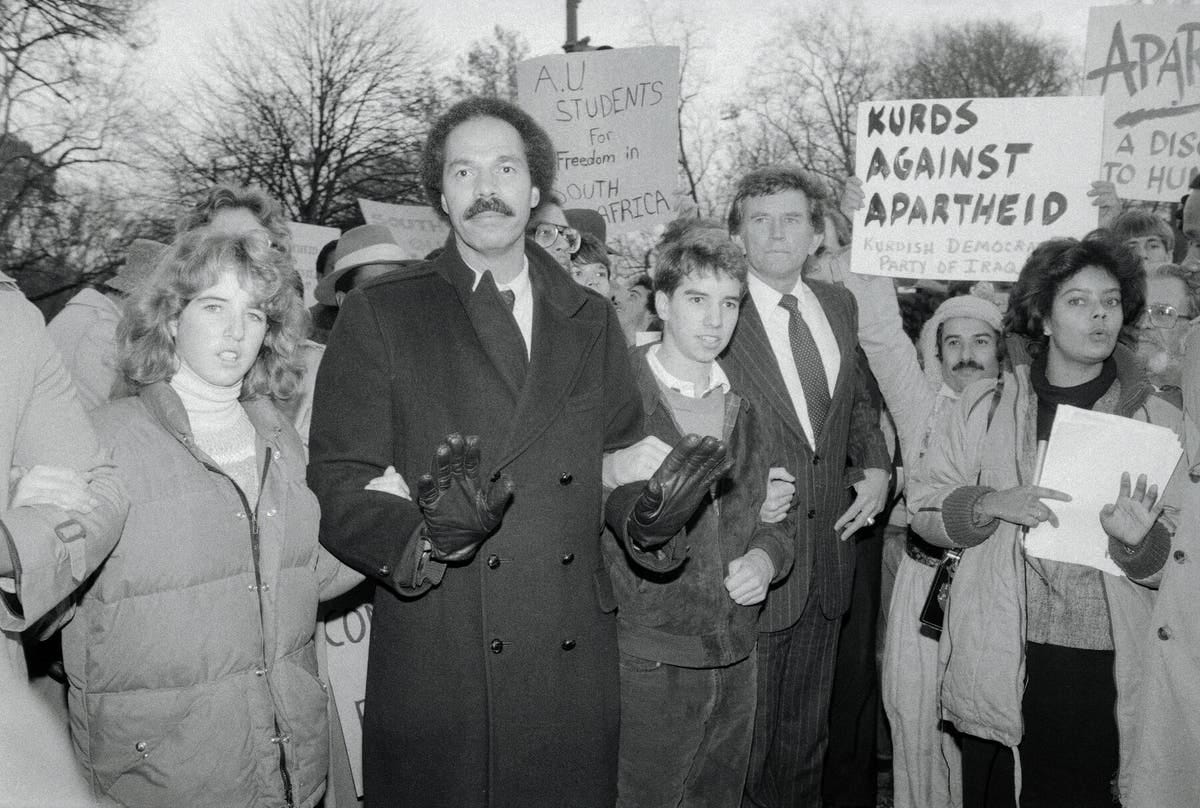
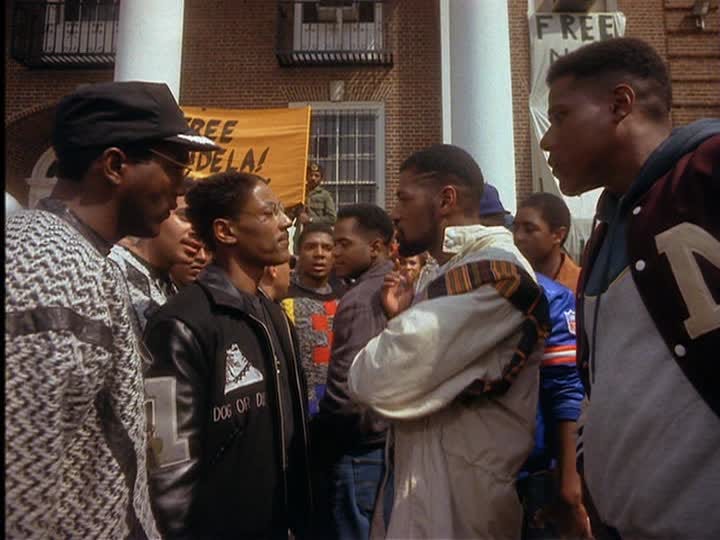
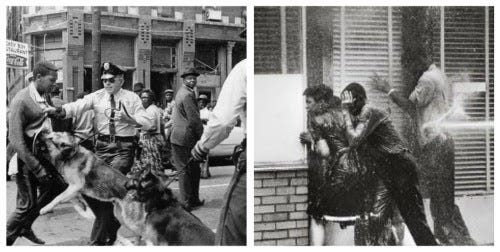
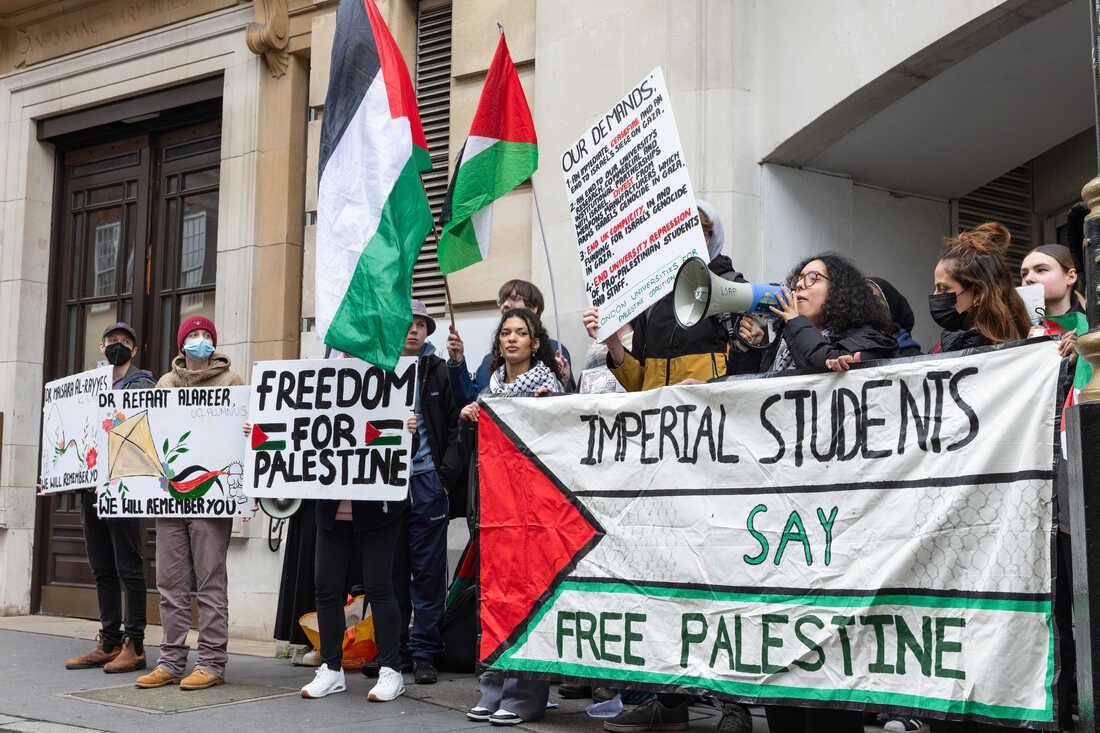

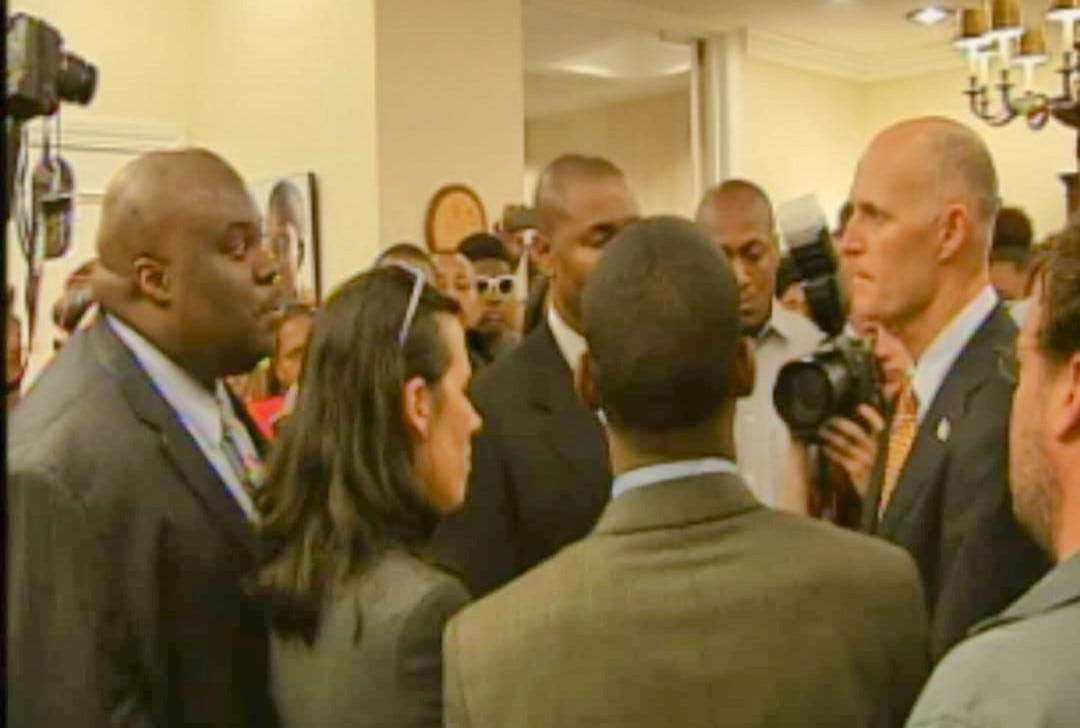
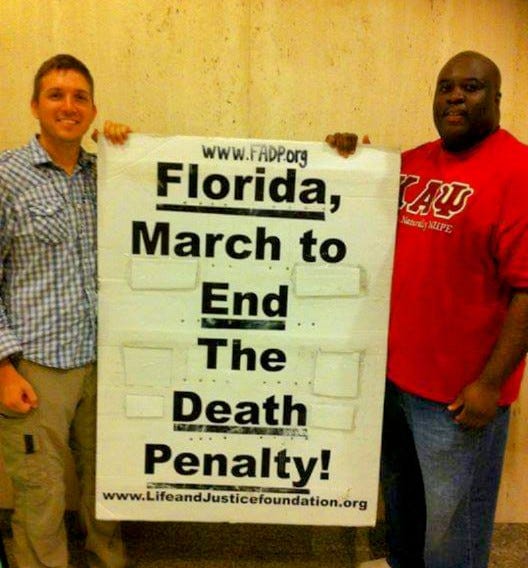
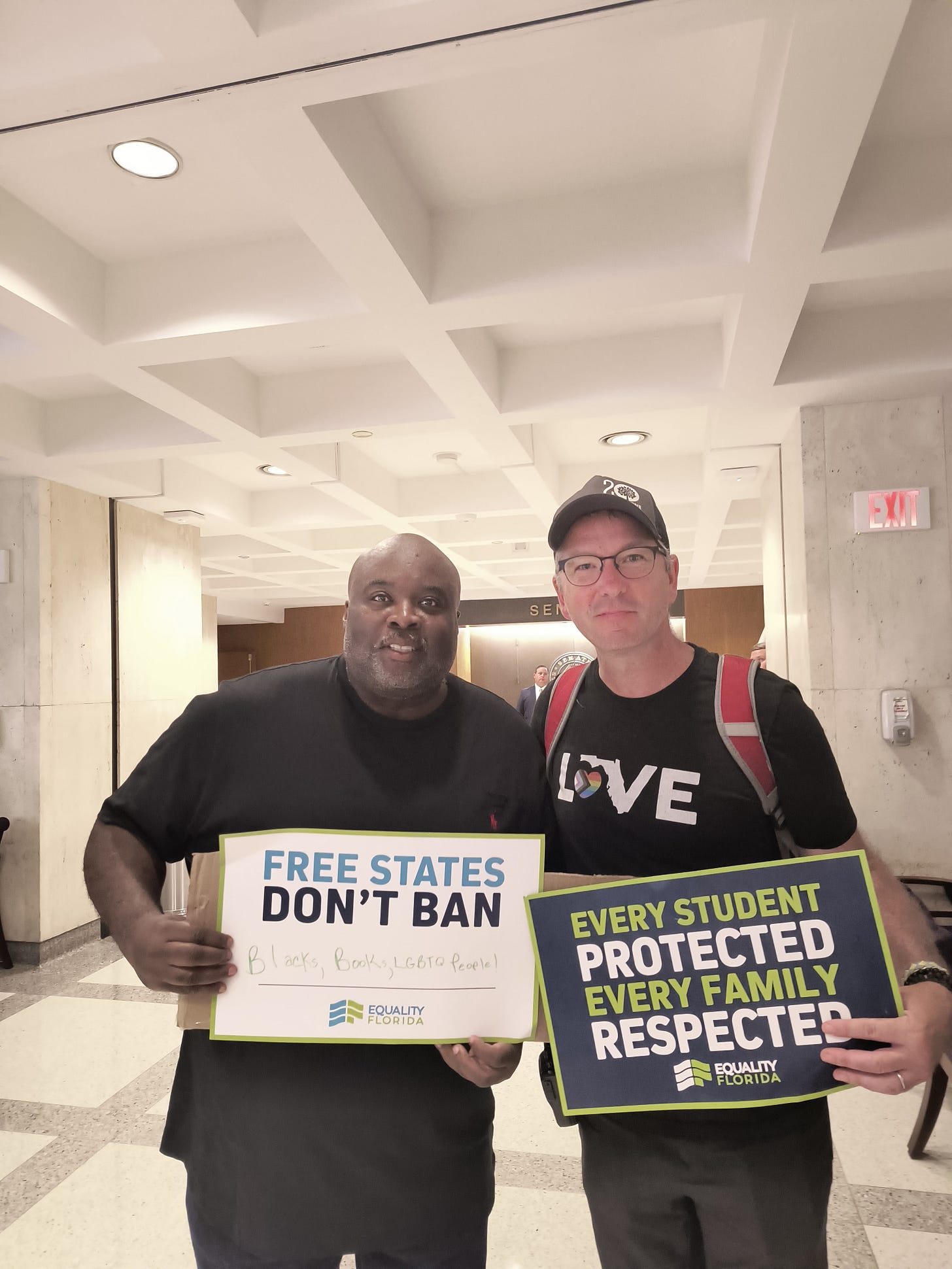
Just learned how real crazy it was for journalists at Kent State watching college students protest the Vietnam War - the photographer who took that pic of the young man laying dead while a younger girl was kneeling and screaming beside his lifeless body, had to hide his film in the wheel/hubcap of his car so he could protect it long to get it back to his publisher…
There will always be something to protest and we try to push, lean, tug and trod forward...the kids are alright! 👏👊✌